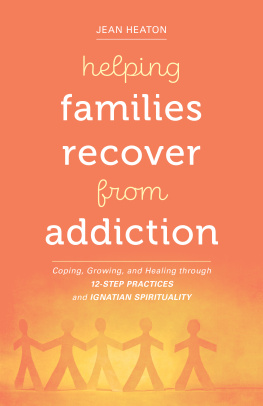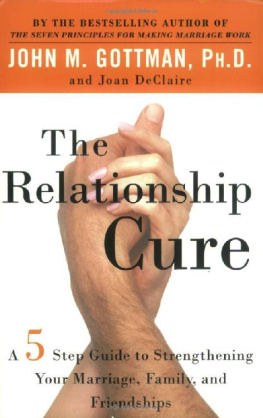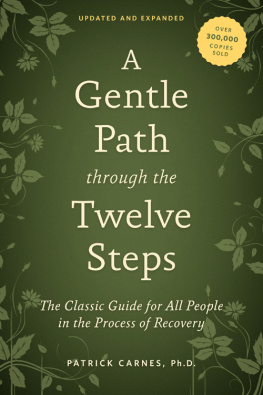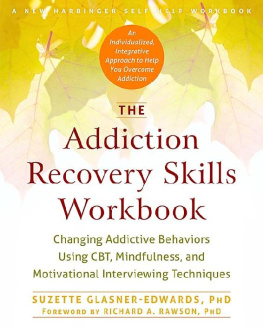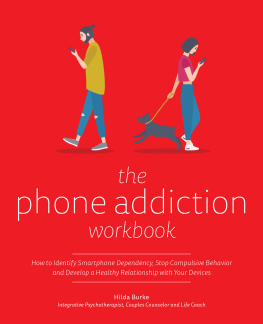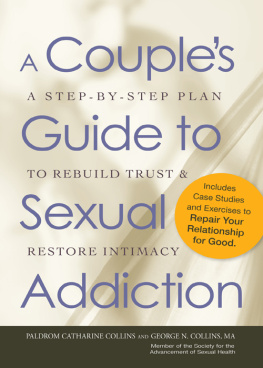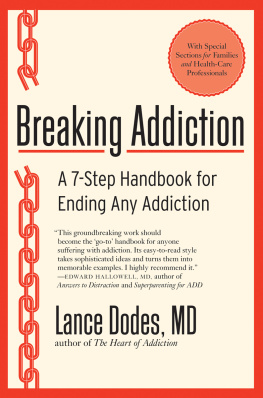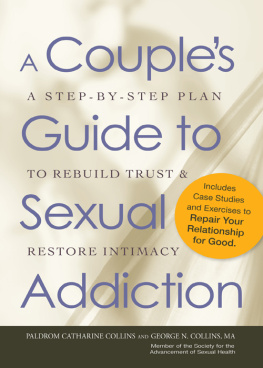Covington - Leaving the enchanted forest: the path from relationship addiction to
Here you can read online Covington - Leaving the enchanted forest: the path from relationship addiction to full text of the book (entire story) in english for free. Download pdf and epub, get meaning, cover and reviews about this ebook. year: 2014;1988, publisher: HarperCollins e-Books, genre: Home and family. Description of the work, (preface) as well as reviews are available. Best literature library LitArk.com created for fans of good reading and offers a wide selection of genres:
Romance novel
Science fiction
Adventure
Detective
Science
History
Home and family
Prose
Art
Politics
Computer
Non-fiction
Religion
Business
Children
Humor
Choose a favorite category and find really read worthwhile books. Enjoy immersion in the world of imagination, feel the emotions of the characters or learn something new for yourself, make an fascinating discovery.

- Book:Leaving the enchanted forest: the path from relationship addiction to
- Author:
- Publisher:HarperCollins e-Books
- Genre:
- Year:2014;1988
- Rating:5 / 5
- Favourites:Add to favourites
- Your mark:
- 100
- 1
- 2
- 3
- 4
- 5
Leaving the enchanted forest: the path from relationship addiction to: summary, description and annotation
We offer to read an annotation, description, summary or preface (depends on what the author of the book "Leaving the enchanted forest: the path from relationship addiction to" wrote himself). If you haven't found the necessary information about the book — write in the comments, we will try to find it.
Covington: author's other books
Who wrote Leaving the enchanted forest: the path from relationship addiction to? Find out the surname, the name of the author of the book and a list of all author's works by series.
Leaving the enchanted forest: the path from relationship addiction to — read online for free the complete book (whole text) full work
Below is the text of the book, divided by pages. System saving the place of the last page read, allows you to conveniently read the book "Leaving the enchanted forest: the path from relationship addiction to" online for free, without having to search again every time where you left off. Put a bookmark, and you can go to the page where you finished reading at any time.
Font size:
Interval:
Bookmark:
LEAVING THE
ENCHANTED FOREST
The Path from Relationship Addiction
to Intimacy
Stephanie Covington
and
Liana Beckett

We dedicate this book to our readers. May it become a pathfinders companion on the journey to the personal rediscovery of an intimate, separate self in wholesome relationship.
Much new ground has been broken in the addiction field in the past decade. Starting from a core of work on alcoholism and drug addictions, the echoes of this pursuit have spread to other, more diffuse addictions. In the past four years the public has come to realize that whether the addictive substance is alcohol, food, work, money, or another person, the underlying addictive process is essentially the same.
Women, especially, have identified with relationship addiction. Many were jolted into realizing that the problems associated with their unhealthy dependence on their partners was anything but unique, and that their unhappy relationships had identifiable causes and predictable courses and consequences. But once convinced, these same women found themselves at a loss for healthier alternatives, for better frames of reference, for new models, for finer discriminationsfor healing themselves and the generational cycle of family addictions and dysfunctional relationships.
What is an optimally functioning family? What are the signs of a healthy relationship? What are its elements? Will I know a positive one when I see one? What do I look for in selecting a partner? Will I know a desirable one when I see one? What do I needand how do I need to changeto be in a relationship that is both healthy and satisfying? These are legitimate questions, and they are universal.
The complexity of our lives and times places tremendous stress on relationships. Today, people change jobs, home, and community more often than in the past. The more frequent willingness of professional women to relocate in pursuit of promotions and career paths adds a new dimension of intricacy to their relationships. And, living as we do in the United States of the late 1980s, we also live in an age of compulsivity, a frenetic activity-oriented climate that encourages and venerates excess, volume, and hyperbole. Conspicuous consumption may be an outdated term, but its reality is very much with us. Endlessly in pursuit of new highs, we drink, eat, smoke, pop pills, spend, and travel more per capita than anyone else on the planet. The legal mood-altering drug industry alone grossed $13.5 billion in 1985. And research shows that, despite the liberated 1970s, more people are having more sexual problemsthe increase is particularly notable in difficulties of inhibited sexual desire. Small wonder. We attempt to numb the gaping void inside with the quick fix of sex, drugs, and excitement, when what we really long for is intimate contact with others and with our higher selves. Today, you dont have to qualify as a relationship addict to find it difficult to maintain a good relationship. And you dont need to have grown up in a dysfunctional family to wonder what makes for a healthy relationship or what makes the hard work of building a satisfying one worthwhile. The new focus on relationship addictions has sparked an intense scrutiny of all relationships and a public appetite for safe forums in which to discuss and work through issues of dependence and of unhealthy relating with the support of others with similar needs and goals. More people are going into psychotherapy with the stated goal to improve their relationships. Even people who come to therapy for other reasons spend much of the session working on relationship issues.
Unhealthy relating is commonly rooted in ones family of origin. Dysfunctional family systems come disguised in many packages; alcohol is merely one of many possible sources of dysfunction. One parent may have been emotionally unavailable because of extended physical or mental illness; another may have created an unstable, unpredictable environment because of emotional immaturity; yet another may have been victimized by economic and sociocultural deprivation and discrimination, with the family experiencing the severely stressful impact of psychological and physical deprivation of a society of plenty. Naturally, depending on these and many other factors, the degree of dysfunction also varies within each family. It must also be remembered that the concept of dysfunction is relativeit reflects the times and the social context. For example, relationships that would have seemed perfectly acceptable, perhaps even desirable, in the 1950s, may be considered dysfunctional or unhealthy today.
All in all, there seems to be a void of information, of guidelines and models, not only for the people who tend to become addicted to others or whose partners are themselves addicts of one kind or another, but for all those who are struggling to have better relationships in a world characterized by turmoil and unpredictability.
Leaving the Enchanted Forest is our attempt to narrow this gap. Models for new, healthier relationships are, in fact, aroundnot as many as wed like yet, because the perspective is new and change is often difficult and slow. Also, because we live in an emotionally closed society and people want to protect their privacy, we are often unaware of the intricacies and challenges couples close to us are facing. We have known several of the couples we introduce in these pages personally and professionally; they have carefully and lovingly built lasting relationships that work for them and that support both partners growth. Their relationships are modelsnot in the sense of blueprints that can be duplicated like cookbook recipes, but rather of guides for a process that leads to individual solutions that work well for that particular couple.
In writing this book, our primary aim has been to address the need of readersespecially womento go one step beyond the awareness of being in unhealthy relationships in which they give away their personal power and sense of self. Many of you now are eager to develop new relationship skills and to channel creatively your newly discovered desire for self-empowerment and self-renewal. Leaving the Enchanted Forest addresses these needs by giving you the opportunity to review past and present relationships, thoughtfully reevaluate your personal beliefs and assumptions, and clarify who you are, what you need, what you want. For those who like structured activities to help them organize their thoughts, most chapters include exercises, writing activities, and experiential practices. These end-of-chapter activities can be used individually or by facilitators of groups for relationship addicts in recovery.
The book also includes information we hope will round out what you already know about addictions and family systemsincluding distinguishing characteristics of optimal families. However, we wish to appeal to those of you who may not relate to an alcoholic or otherwise dysfunctional family of origin. Dont put this book down because the terms dont seem to fit. Much of the time we do refer to the chemical dependency model to make a point. It is an excellent analogy for relationship addictions, one that will resonate with many readersespecially chemically dependent women in recovery for whom relationship addiction becomes a substitute for alcohol addiction. It is also a model we are familiar with in our work and through our belief in the power of twelve-step groups to heal both the addiction and the spirit. However, we also believe the information, activities, and inner work that
Next pageFont size:
Interval:
Bookmark:
Similar books «Leaving the enchanted forest: the path from relationship addiction to»
Look at similar books to Leaving the enchanted forest: the path from relationship addiction to. We have selected literature similar in name and meaning in the hope of providing readers with more options to find new, interesting, not yet read works.
Discussion, reviews of the book Leaving the enchanted forest: the path from relationship addiction to and just readers' own opinions. Leave your comments, write what you think about the work, its meaning or the main characters. Specify what exactly you liked and what you didn't like, and why you think so.

